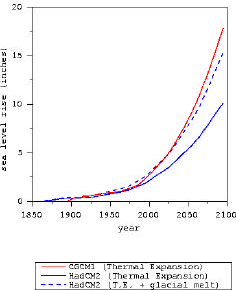You are here: Home › Stressors › Climate Change › Current Programs › Sea Level Rise Research Program
New: North CarolinaPilot Project Site >>>
Sea Level Rise Research Program
The Ecological Effects of Sea Level Rise
Click here for printable fact sheet
Issue

Worldwide sea level has risen about 20 cm during the past century and will inevitably be affected by climate change in the future. The rate of sea level rise during the twentieth century has been nearly 2 mm per year, which is an order of magnitude higher than the average over the last several millennia. By 2095 the projected rise worldwide is 18 cm- 55 cm (IPCC 2007). Locally, the rate of sea level rise can differ significantly from the global mean due to vertical movements of the land, which can be of the same order (mm/yr) as sea level changes. In the U.S., the Southeast and Gulf coasts are particularly vulnerable.Sea-level rise and climate change issues in the coastal zone include:
- higher and more frequent flooding of wetlands and adjacent shores
- expanded flooding during severe storms and high tides
- increased wave energy in the near-shore area
- upward and land-ward migration of beaches
- accelerated coastal retreat and erosion
- intrusion into coastal freshwater aquifers
- damage to coastal infrastructure
- broad impacts on the coastal economy
Approach
The Ecological Effects of Sea Level Rise (EESLR) program brings together University researchers and NOAA scientists to help coastal managers and planners better prepare for changes in coastal ecosystems due to land subsidence and sea level rise. Specialists in biology, geomorphology and coastal modeling join forces to integrate storm surge models with ecological models for more precise predictions of how future sea level will affect coastal wetlands, submerged aquatic vegetation, sub tidal habitat and oyster reefs.This proactive approach, especially in vulnerable coastal wetlands, which are important habitat for a number of commercially valuable fish and shellfish, is needed rather than regulatory protection alone. Since state governments have the primary responsibility for developing strategies to mitigate adverse impacts, we are working with state managers to develop plans that will best respond to their needs.
Management/Policy Issues
Rising sea level has worldwide consequences because of its potential to alter ecosystems and habitability of coastal regions. The vulnerability of coastal areas varies with shoreline physical attributes and the amount of development. Low lying developed areas in the Mid-Atlantic, Southeast, and Gulf Coast are especially at risk. Damages and economic losses could be reduced if decision makers understand the potential impacts of sea level rise and use this information for planning. This research will develop tools useful for coastal managers to mitigate regional ecological impacts of sea level rise. A significant coastal management issue that is yet to be addressed is the conversion of IPCC estimates of global sea level rise down to regional and local levels, through the inclusion of land movements caused, for example, by subsidence. This local level of sea level rise prediction is a goal of the CSCOR program. In addition, our goal is a planning process made flexible enough to incorporate future improvements in scientific understanding, both of climate change and of coastal processes.
Accomplishments
Initiated in 2003, our partners within NOAA have developed a hydrodynamic tide and storm surge model of Pamlico, Albemarle, Core, and Bogue Sounds as well as adjacent estuarine and coastal waters. A high-resolution, topographic /bathymetric digital elevation model (DEM) is combined with the hydrodynamic model to integrate recent airborne LIDAR topographic data and bathymetric data. In addition, CSCOR has competitively funded three research proposals that will integrate ecological models and the hydrodynamic model into a broad based landscape model to incorporate spatial structure affects on the behavior and functioning of the landscape as a whole. The winning proposals began work in May 2005, and are listed below.
- SLR2005: Shore-Zone Modification in Response to Sea Level Rise in North Carolina Estuaries
- SLR2005: Ecological Effects of Sea-Level Rise on Coastal North Carolina Marshes
- SLR2005: Estuarine Habitat Response to Rising Water Level
Completion of the North Carolina project is projected in 2008, and we are currently planning expansion of EESLR to the Florida/Alabama Panhandle.
North Carolina Coastal Managers' Input Directly Shapes Future NCCOS Science Priorities for their Benefit
Over fifty coastal zone managers and stakeholders from North Carolina participated in a workshop sponsored by the National Centers for Coastal Ocean Science (NCCOS) to discuss and identify potential scientific tools that will assist coastal zone governing agencies and businesses in mitigating the regional impacts of sea level rise and extreme events.
More...
Additional Information about EESLR:
- Planning for the Impacts of Sea Level Rise and Climate Change: Workshop Summary Report
- NOAA's Sea Level Rise Research Program: North Carolina, Managers Meeting Fact Sheet
- CSCOR sponsored a workshop to explore the ecological effects of sea level rise in Beaufort, North Carolina on February 4-5, 2004. A white paper with the results from the workshop gives guidance from the research and management community in the major areas of research needed to help coastal managers mitigate regional ecological impacts of sea level rise.

